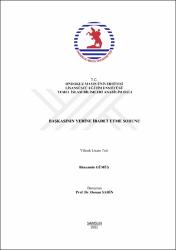Başkasının yerine ibadet etme sorunu
Citation
Gümüş, B. (2021). Başkasının yerine ibadet etme sorunu. (Yüksek lisans tezi). Ondokuz Mayıs Üniversitesi, Samsun.Abstract
İslam dinine göre ibadetlerde asıl olan mükellefin, ibadeti bizzat kendisinin eda
etmesidir. Ancak kimi zaman hastalık yaşlılık vb. hayat şartları buna izin
vermeyebilir. Bu sebeple İslam dini, insanlara bazı durumlarda başkasının yerine
ibadet etme ruhsatı tanımıştır.
Bu çalışmada Hanefi, Maliki, Şafii ve Hanbeli mezhepleri esas kabul edilerek
başkasının yerine ibadet etmenin hangi durumlarda mümkün olup olmayacağı
konusu ele alınmıştır. Konu kavramsal çerçeve ve meselenin temel dayanağı ele
alındıktan sonra sırf bedenen yapılan ibadetlerde, sırf mali olarak yapılan ibadetlerde,
adak ve kefaretlerin ifasında niyabet olarak dört başlık altında incelenmiştir.
Bedeni ibadetlerde başkasının yerine ibadetin ifası mümkün değilken, mali
ibadetlerde genel olarak geçerli, hem mal hem de beden ile yapılan ibadetlerde ise
belirli şartlarda mümkün gözükmektedir. According to the Islamic religion, the main taxpayer is the self-fulfillment of
the worship. However, sometimes life conditions may not allow this. For this reason,
Islam has given people a license to worship in some cases instead of someone else.
In this study, the issue of whether or not it is possible to worship in someone
else's place by considering the Hanafi, Maliki, Shafi and Hanbali sects as the basis is
discussed. After discussing the conceptual framework and the basic basis of the
issue, it has been examined under four headings as prayers performed solely in the
body, in worship only financially, in the performance of vows and penance.
While it is not possible to perform someone else's place of worship in bodily
worship, it is generally valid for financial worship, and it seems possible under
certain conditions in both goods and body worship
















